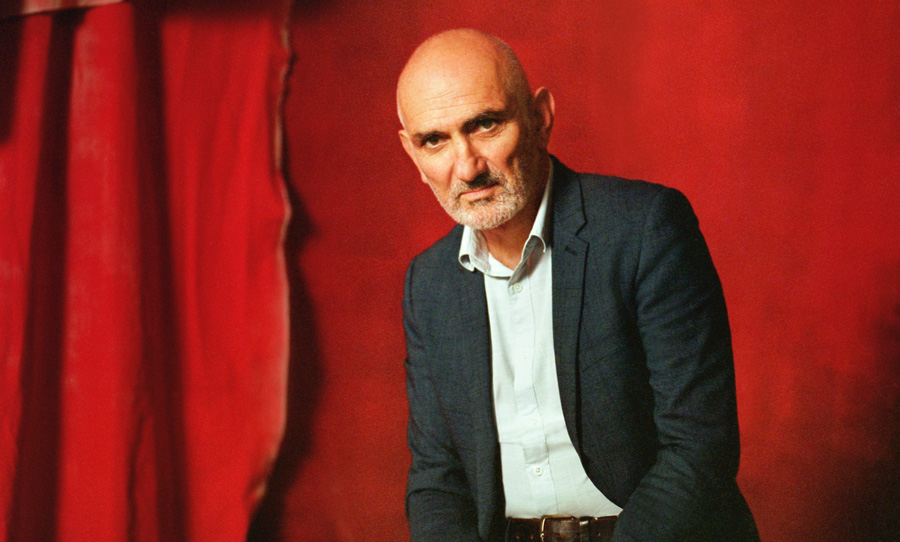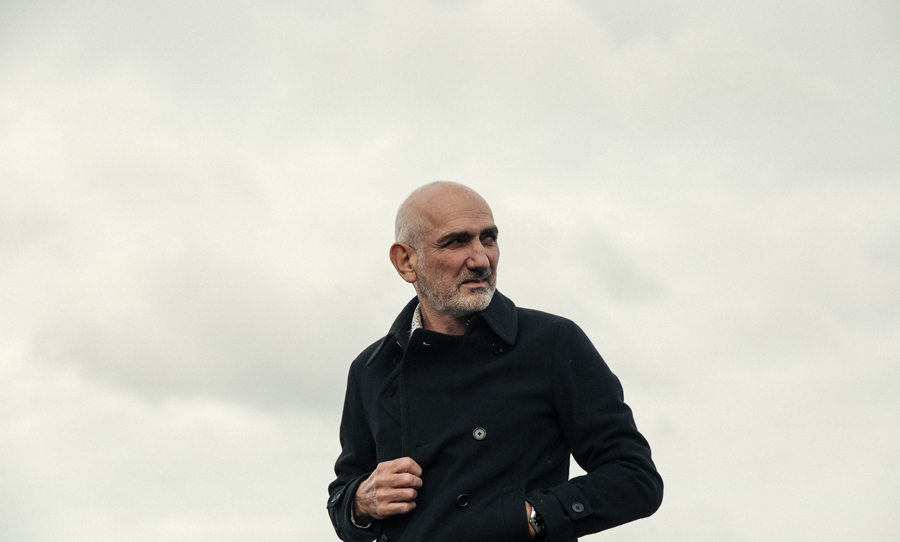Paul Kelly’s music has resonated with generations of Australians. In his new release, Paul Kelly’s Christmas Train, he views this special time from many perspectives.
Growing up in a “big Catholic family”, Paul Kelly’s love for Christmas carols was baked in from an early age. It’s a tradition that he’s kept alive over the years and now forms a familial bond over three generations.
So perhaps he was destined to go down the Christmas album route. And while many an artist has donned the Santa hat and shlocked their way through the classics, Paul Kelly has decided to illuminate the story of Christmas with a multitude of colours — some quirky, some provocative, and others genuinely spellbinding.
Take his playful yet reverent treatment of Silent Night, with its soaring Hawaiian slide guitar, or The Virgin Mary Had One Son — a faithful tribute to The Staple Singers’ arrangement starring Emma Donovan and long time Kelly collaborators, Vika and Linda Bull. Or the album’s subdued centrepiece, Surah Maryam, that features a memorable spoken word performance from Waleed Aly. Not to mention Kelly’s own contribution to this diverse canon — of course How To Make Gravy had to be there — this time in a fresh, emotionally charged live rendition.
Moreover, the album signifies a learning experience. Extensively researched and curated with the help of some incredible collaborators, it presents the stories and experiences of Christmas through myriad lenses, spanning the secular and the sacred. We spoke with Paul Kelly about his connection to Christmas, the challenges involved in interpreting this vast repertoire, and how the tradition — and its music — continues to evolve.

HAPPY: Silent Night features in your own family carols, your sister Mary-Jo arranged vocals on The Little Drummer Boy, and your daughters and other family members contributed heavily to the making of the record. It all forms a vivid picture of the carolling tradition in the Kelly home. Did you grow up with that tradition, or has it evolved more in recent years?
PAUL: Yeah, we grew up singing carols. Christmas was a big thing in our family — we’re a big Catholic family and there were eight of us. We celebrated Santa and Jingle Bells and all of that, but Jesus and Mary was a big part of our growing up as well. We continue now, though we’re a bit more scattered — my siblings are across three states. But our children have children now and this year in Melbourne it’ll be Christmas Eve with some of my siblings, with three generations of the family. Some friends always come by. We’ll have about 30 people in the house on Christmas Eve. We’ll stumble our way through some carols. We don’t take it that seriously. It’s just to have fun and sing together.
I wanted to bring that across into the record. Apart from having family members on the record, I wanted to have a lot of harmonies, which happens in Coventry Carol, Silent Night, Little Drummer Boy and the Hebrew song, Shalom Aleichem.
HAPPY: It’s a richly vocal record. But the melodies and harmonies that are quite unfamiliar to the modern ear — like Shalom Aleichem, Coventry Carol, and Intonent Hodie — I imagine they must have been challenging to perform. Can you tell me about some of those challenges and what you learned about the craft of singing through making this record?
PAUL: One thing that I’ve really enjoyed is getting the chance to sing bass vocal on a few tracks. On Coventry Carol, for example, most of the work is done by the three women — Alice Keath, Jess Hitchcock, and Kate Miller-Heidke, who takes the top. They’ve sung in choirs and are classically trained so they could attack it with confidence. One verse is all-male voices — which is the menacing verse about King Herod — and there’s another verse where the men sing under the women.
We were still trying to bridge classical and contemporary. The women weren’t singing in a classical manner, they were close to the mic, singing intimately. You could hear them breathe. So it was edging toward a pop production.
Alice coached Sime Nugent and I in the bass section. We had Marlon Williams on top of the men — which he did remotely because he couldn’t leave New Zealand. So it was a bit of a logistical challenge. Marlon is also classically trained, as you can hear in his own song (Tapu te Pō (O Holy Night)) so he could handle it. Alice was a beautiful teacher. She showed us the way to get to the perfect intonation — somewhere between classical and modern. It comes down to the way you sound out the vowels. She did the same for Silent Night in the German section, as she’s a fluent speaker. That was fun for me: getting set those challenges and having to step up.
HAPPY: And on that same point, you’ve set poems like John Donne’s Nativity and Thomas Hardy’s The Oxen, to music. Do works like these have an inherent musicality to you? Or are you wrestling with their rhythms to make it work?
PAUL: That’s a difficult question to answer because I knew them both as poems before I thought of putting music to them. They are poems that rhyme so I thought it would be interesting to try and put music to them. The Oxen came together pretty quickly, but I played around with Nativity for a while.
HAPPY: They do sound effortless on the record, but that can belie the labour involved.
PAUL: Yes, sometimes the most relaxed sounding song can be the most work. O Holy Night was an example of that, but for different reasons. Marlon couldn’t come and sing with us, so we were hearing demos that he’d sung into his phone. We played along to his demo in the studio, following all the natural pauses and slowdowns, and then sent it back to him. Then he sang his part, then we brought it back and recorded the choir (The Dhungala Children’s Choir).
It was all based on Marlon’s blueprint. He made this little phone demo of the song — which is just about my favourite recording of all time — where he sang his idea for the choir part in falsetto against himself. Another one of the joys of the record was that other people brought so much to it. A lot of my job was done when I put the right person with the right song. I suggested that Marlon do that song and he said “it’s my favourite song,” so I knew I was on the right track. He drove the arrangement from that point on.
Another example of right person, right song was when I suggested to Alma Zygier to record What Are You Doing New Year’s Eve? with her father. So they just did it and home and sent it to me. Some of the time, I wasn’t even in the room when these tracks were done. I like the fact that we’ve got me and my daughters opening the record with Nativity, and another father and daughter duo to close it out.
HAPPY: That’s not to say that there aren’t a few curveballs as well. Swing Around The Sun has a pretty unfamiliar sound for Paul Kelly fans.
PAUL: Yes, that one was written by Casey Bennetto, who wrote Keating! the musical and a very versatile songwriter. He does live Christmas shows every year, where he gets various people to do songs backed by his house band. I saw them play Swing Around The Sun years ago and I told him: “If I ever do a Christmas record, I wouldn’t mind having a crack at that.”
It took a bit of work that one. Not least because it’s got 19 chords in it and modulates all over the place! But we wanted to do it in the swingin’ way it was written. I’m a big Louis Prima fan, so I wanted the song to get to a Louis Prima situation by the end and I think we got there.
HAPPY: Amidst the reimaginings are also homages. I’m thinking of Christmas (Baby, Please Come Home), which really does have the Phil Spector ‘Wall of Sound’ happening, and Christmas Must Be Tonight which perfectly captures the atmosphere of The Band. Are there any productions where you thought, ‘Yeah, I’ve really nailed the sound of the original’?
PAUL: We’ve been doing Christmas (Baby, Please Come Home) live for a while and it always closes our end of year shows. Usually, we’ve got a whole lot of people on stage with Linda Bull doing the lead vocals with many backing vocals behind her. It definitely references the original but I think Linda really makes it her own.

HAPPY: There’s a surprising political theme that emerges in songs like Arthur McBride and In The Hot Sun Of A Christmas Day. Did you discover a vein of rebellious Christmas tunes during the course of putting the album together, even if they didn’t make the final cut?
PAUL: No I haven’t, but I haven’t really looked along those lines. I’ve known Arthur McBride for a long, long time. The definitive version in my eyes, and ears, is Paul Brady’s version from the ’70s. He did a record with Andy Irvine and that song’s on it and Paul plays that solo in a virtuosic fashion. We certainly couldn’t replicate that — that was one we really had to wrestle to find our way into it. I’ve just always loved the song. It’s a pretty tenuous connection to Christmas — the only connection is that the events happen on Christmas Day. It’s a beautiful song with great imagery.
And Caetano Veloso, he’s just one of my favourite songwriters. I love Brazilian music. It’s got all the elements you want in music: great rhythms, great harmonies, complex chords with beautiful colours. I wanted to have a song that really makes you feel the heat of Christmas. As you observe, it’s a political song. He and Gilberto Gil had to leave Brazil and were exiled in London. I was aware that these two tracks were echoes of each other, which is something I try to do in records: a song that has a counterpart later in the record, so I always had those two paired in my mind.
HAPPY: And considering that the album, in some ways, opens up a Pandora’s box of Christmas themes and questions, do you think there’ll be a volume two? Or is this your definitive Christmas statement?
PAUL: Oh, I don’t think anything is ever definitive, especially with Christmas. For centuries and centuries, it’s inspired great music. One of the beauties of streaming is that you can add to things. I’ve already thought about next year and how we might add a Christmas song every year, for ten years. And then we could make it a physical thing, I’m sure vinyl will still exist. I think of it as something that can grow and evolve.
Paul Kelly’s Christmas Train is out now via EMI Music. Stream or purchase here.
Interview by Dan Shaw.



